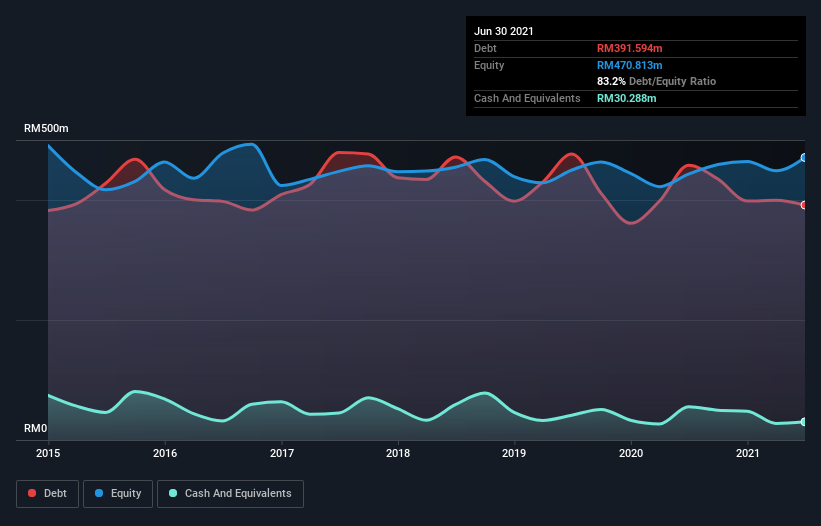- Malaysia
- /
- Commercial Services
- /
- KLSE:PBSB
We Think Pelikan International Corporation Berhad (KLSE:PELIKAN) Is Taking Some Risk With Its Debt

Howard Marks put it nicely when he said that, rather than worrying about share price volatility, 'The possibility of permanent loss is the risk I worry about... and every practical investor I know worries about.' When we think about how risky a company is, we always like to look at its use of debt, since debt overload can lead to ruin. Importantly, Pelikan International Corporation Berhad (KLSE:PELIKAN) does carry debt. But should shareholders be worried about its use of debt?
Why Does Debt Bring Risk?
Debt assists a business until the business has trouble paying it off, either with new capital or with free cash flow. If things get really bad, the lenders can take control of the business. However, a more usual (but still expensive) situation is where a company must dilute shareholders at a cheap share price simply to get debt under control. By replacing dilution, though, debt can be an extremely good tool for businesses that need capital to invest in growth at high rates of return. When we examine debt levels, we first consider both cash and debt levels, together.
Check out our latest analysis for Pelikan International Corporation Berhad
What Is Pelikan International Corporation Berhad's Net Debt?
The image below, which you can click on for greater detail, shows that Pelikan International Corporation Berhad had debt of RM391.6m at the end of June 2021, a reduction from RM457.8m over a year. However, because it has a cash reserve of RM30.3m, its net debt is less, at about RM361.3m.

A Look At Pelikan International Corporation Berhad's Liabilities
According to the last reported balance sheet, Pelikan International Corporation Berhad had liabilities of RM517.5m due within 12 months, and liabilities of RM405.5m due beyond 12 months. Offsetting these obligations, it had cash of RM30.3m as well as receivables valued at RM294.4m due within 12 months. So its liabilities outweigh the sum of its cash and (near-term) receivables by RM598.4m.
The deficiency here weighs heavily on the RM301.6m company itself, as if a child were struggling under the weight of an enormous back-pack full of books, his sports gear, and a trumpet. So we definitely think shareholders need to watch this one closely. After all, Pelikan International Corporation Berhad would likely require a major re-capitalisation if it had to pay its creditors today.
We use two main ratios to inform us about debt levels relative to earnings. The first is net debt divided by earnings before interest, tax, depreciation, and amortization (EBITDA), while the second is how many times its earnings before interest and tax (EBIT) covers its interest expense (or its interest cover, for short). Thus we consider debt relative to earnings both with and without depreciation and amortization expenses.
Weak interest cover of 2.0 times and a disturbingly high net debt to EBITDA ratio of 7.1 hit our confidence in Pelikan International Corporation Berhad like a one-two punch to the gut. The debt burden here is substantial. However, one redeeming factor is that Pelikan International Corporation Berhad grew its EBIT at 10% over the last 12 months, boosting its ability to handle its debt. There's no doubt that we learn most about debt from the balance sheet. But it is Pelikan International Corporation Berhad's earnings that will influence how the balance sheet holds up in the future. So when considering debt, it's definitely worth looking at the earnings trend. Click here for an interactive snapshot.
Finally, while the tax-man may adore accounting profits, lenders only accept cold hard cash. So we clearly need to look at whether that EBIT is leading to corresponding free cash flow. Over the most recent three years, Pelikan International Corporation Berhad recorded free cash flow worth 59% of its EBIT, which is around normal, given free cash flow excludes interest and tax. This cold hard cash means it can reduce its debt when it wants to.
Our View
To be frank both Pelikan International Corporation Berhad's net debt to EBITDA and its track record of staying on top of its total liabilities make us rather uncomfortable with its debt levels. But on the bright side, its conversion of EBIT to free cash flow is a good sign, and makes us more optimistic. We're quite clear that we consider Pelikan International Corporation Berhad to be really rather risky, as a result of its balance sheet health. So we're almost as wary of this stock as a hungry kitten is about falling into its owner's fish pond: once bitten, twice shy, as they say. There's no doubt that we learn most about debt from the balance sheet. But ultimately, every company can contain risks that exist outside of the balance sheet. Be aware that Pelikan International Corporation Berhad is showing 3 warning signs in our investment analysis , and 2 of those are potentially serious...
If, after all that, you're more interested in a fast growing company with a rock-solid balance sheet, then check out our list of net cash growth stocks without delay.
If you're looking to trade PBS Berhad, open an account with the lowest-cost platform trusted by professionals, Interactive Brokers.
With clients in over 200 countries and territories, and access to 160 markets, IBKR lets you trade stocks, options, futures, forex, bonds and funds from a single integrated account.
Enjoy no hidden fees, no account minimums, and FX conversion rates as low as 0.03%, far better than what most brokers offer.
Sponsored ContentNew: Manage All Your Stock Portfolios in One Place
We've created the ultimate portfolio companion for stock investors, and it's free.
• Connect an unlimited number of Portfolios and see your total in one currency
• Be alerted to new Warning Signs or Risks via email or mobile
• Track the Fair Value of your stocks
This article by Simply Wall St is general in nature. We provide commentary based on historical data and analyst forecasts only using an unbiased methodology and our articles are not intended to be financial advice. It does not constitute a recommendation to buy or sell any stock, and does not take account of your objectives, or your financial situation. We aim to bring you long-term focused analysis driven by fundamental data. Note that our analysis may not factor in the latest price-sensitive company announcements or qualitative material. Simply Wall St has no position in any stocks mentioned.
Have feedback on this article? Concerned about the content? Get in touch with us directly. Alternatively, email editorial-team (at) simplywallst.com.
About KLSE:PBSB
PBS Berhad
Manufactures and distributes fine writing and stationeries in Malaysia, Singapore, China/Taiwan, Thailand, Greece, and internationally.
Excellent balance sheet slight.
Market Insights
Community Narratives




